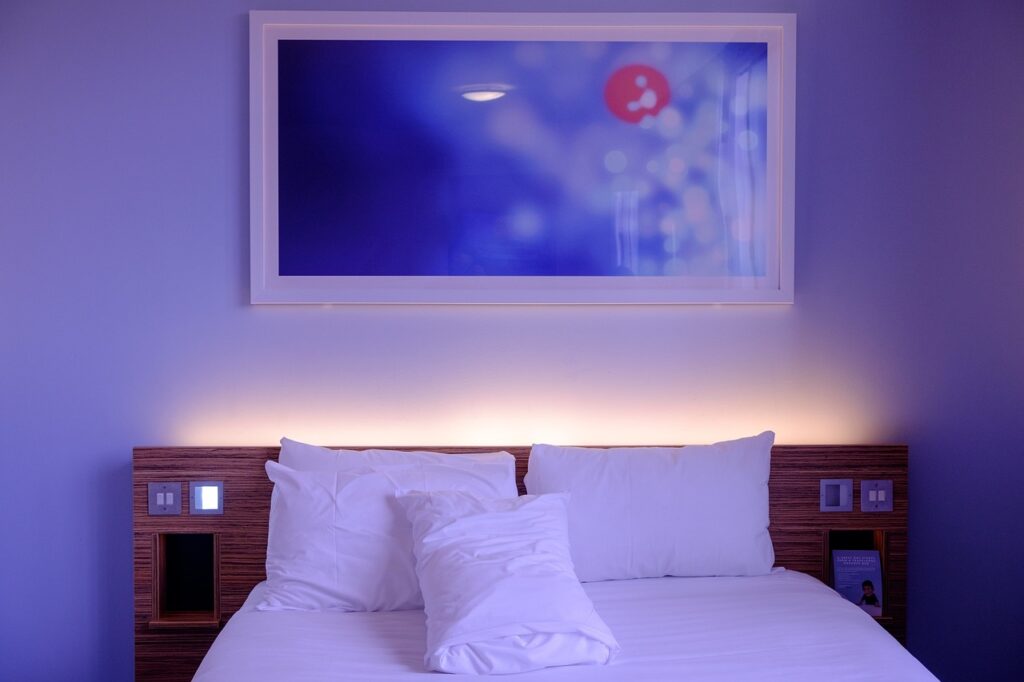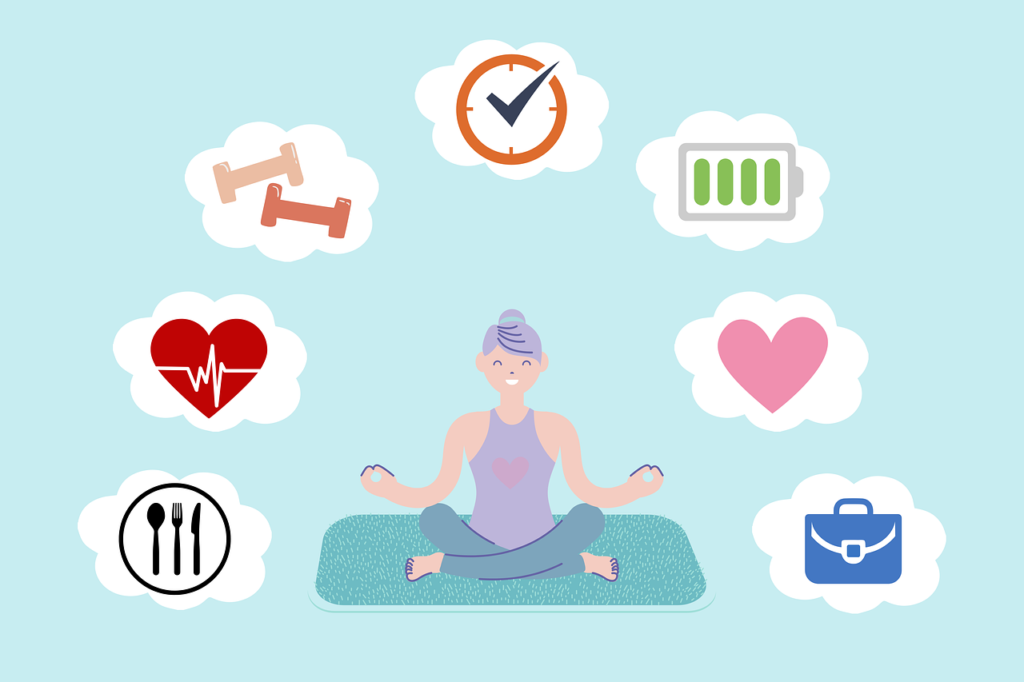Sharing is caring!
In today’s fast-paced world, the importance of sleep is often overshadowed by the demands of daily life. Yet, improving mental health through sleep is a critical, albeit frequently overlooked, aspect of overall well-being. While most people recognize that sleep is essential for physical health, its profound impact on mental health is not as widely discussed. This article aims to shed light on this vital connection, exploring how quality sleep can be a powerful tool in enhancing mental health
The Science Behind Sleep and Mental Health
Understanding the science behind improving mental health through sleep requires delving into the complex processes that occur within the brain and body during sleep. Sleep is a dynamic state that significantly influences our cognitive functions, emotional stability, and overall mental health. Despite its apparent simplicity, sleep involves intricate biological mechanisms that are essential for maintaining a healthy mind
Brain Activity and Emotional Regulation

During REM sleep, the brain processes and integrates emotional experiences from the day. This stage is crucial for emotional regulation, as it helps individuals process their emotions and reduces the intensity of emotional reactions. The amygdala, the brain region responsible for emotional responses, becomes less reactive after a good night’s sleep, allowing for more rational and measured responses to stress and negative stimuli.
Cognitive Function and Memory Consolidation
Deep sleep and REM sleep are vital for memory consolidation, the process by which short-term memories are transformed into long-term memories. This process not only enhances learning and cognitive function but also plays a role in emotional memory processing. By strengthening neural connections, sleep helps individuals better remember and understand their emotional experiences, contributing to improved mental health and resilience.
Hormonal Regulation and Stress Reduction
Sleep also plays a significant role in regulating stress hormones, such as cortisol. High cortisol levels, often associated with chronic stress, can impair cognitive function and emotional stability. Adequate sleep helps regulate cortisol levels, promoting a more balanced stress response and reducing the risk of stress-related mental health issues.
The Impact of Poor Sleep on Mental Health
Poor sleep is not just a minor inconvenience; it can have profound and far-reaching effects on mental health. The relationship between sleep disturbances and mental health disorders is well-documented, with insufficient or poor-quality sleep exacerbating various mental health issues. Understanding these impacts underscores the importance of addressing sleep problems to improve overall mental well-being.
The Vicious Cycle of Sleep Deprivation and Mental Health

One of the most concerning aspects of sleep deprivation is its bidirectional relationship with mental health disorders. Poor sleep can contribute to the development and worsening of mental health issues, which in turn can lead to further sleep disturbances. This vicious cycle makes it challenging for individuals to break free from the grip of both sleep problems and mental health disorders.
-
- Increased Risk of Depression and Anxiety
Sleep deprivation significantly increases the risk of developing depression and anxiety. Lack of sleep affects the brain’s ability to regulate emotions and cope with stress. For instance, individuals who consistently get less than the recommended 7-8 hours of sleep per night are more likely to experience symptoms of depression and anxiety. This is partly due to the disruption of neurotransmitter balance, particularly serotonin and dopamine, which play critical roles in mood regulation.
-
- Exacerbation of Existing Mental Health Issues
For those already struggling with mental health disorders, poor sleep can exacerbate their symptoms. A study published in BMJ Open highlights how sleep problems can contribute to suicidal thoughts and behaviors among individuals with major depression and suicidal ideation. The study found that being awake at night, with reduced support from friends and family, increased the risk of suicide attempts. Additionally, failing to achieve good sleep exacerbated depression symptoms such as negative thinking, attention difficulties, and inactivity【BMJ Open】.
-
- Cognitive Impairment and Emotional Dysregulation
Sleep is crucial for cognitive functions such as attention, memory, and decision-making. Poor sleep impairs these functions, leading to difficulties in concentration, problem-solving, and managing daily tasks. Emotional dysregulation is another significant consequence of sleep deprivation. Without sufficient sleep, the brain’s ability to process and regulate emotions diminishes, leading to increased irritability, mood swings, and a reduced ability to cope with stress.
The Role of Sleep in Stress and Anxiety

Stress and anxiety are both causes and consequences of poor sleep. High stress levels can make it difficult to fall asleep and stay asleep, leading to chronic sleep deprivation. Conversely, lack of sleep can heighten the body’s stress response. This creates a feedback loop where stress and poor sleep perpetuate each other. Managing stress through relaxation techniques and improving sleep hygiene can help break this cycle and reduce anxiety.
Sleep and Suicidality
The connection between sleep disturbances and suicidality is particularly alarming. The BMJ Open study mentioned earlier emphasizes that nighttime is a high-risk period for those experiencing suicidal ideation due to the lack of immediate social support. Addressing sleep problems in mental health treatment plans is crucial for reducing the risk of suicide. This involves not only improving sleep quality but also considering night-time service provision as part of suicide prevention efforts.
Benefits of Quality Sleep for Mental Health
Quality sleep is a cornerstone of mental health, offering numerous benefits that extend beyond simply feeling rested. When individuals prioritize improving mental health through sleep, they unlock a myriad of positive effects on their cognitive, emotional, and psychological well-being. Here, we explore the various ways in which quality sleep contributes to mental health, emphasizing the transformative power of a good night’s rest.

Enhanced Mood and Emotional Stability
One of the most immediate benefits of quality sleep is improved mood and emotional stability. Adequate sleep helps regulate the production of neurotransmitters such as serotonin and dopamine, which play critical roles in mood regulation. When these chemicals are balanced, individuals are less likely to experience mood swings, irritability, and symptoms of depression and anxiety. Consistent, restful sleep enables the brain to process emotions more effectively, reducing the likelihood of negative emotional responses and enhancing overall emotional resilience.
Improved Cognitive Function
Quality sleep is essential for optimal cognitive function. During sleep, particularly in the REM stage, the brain consolidates memories, processes information, and strengthens neural connections. This leads to better learning, improved problem-solving skills, and enhanced creativity. Individuals who consistently get sufficient sleep are more likely to experience clear thinking, better concentration, and improved decision-making abilities. This cognitive sharpness can significantly boost productivity and performance in daily activities and professional tasks.
Reduced Stress Levels
Chronic stress is a major contributor to mental health issues. Quality sleep helps mitigate the effects of stress by lowering cortisol levels, the body’s primary stress hormone. When the body is well-rested, it is better equipped to handle stressors, resulting in a more balanced stress response. This reduction in stress not only improves mental health but also has a positive impact on physical health, as chronic stress is linked to various health problems such as hypertension and weakened immune function.
Strengthened Immune System
While often overlooked, the immune system plays a critical role in mental health. Quality sleep enhances immune function, making the body more resilient to illnesses and infections. A robust immune system contributes to better overall health, which can reduce the physical and psychological burden of illness. When individuals are physically healthy, they are more likely to experience positive mental health outcomes, as the mind and body are intrinsically connected.
Bullet Point Highlight: Key Benefits of Quality Sleep for Mental Health
-
- Enhanced Mood and Emotional Stability: Balanced neurotransmitter production leads to improved mood and reduced symptoms of depression and anxiety.
-
- Improved Cognitive Function: Better memory consolidation, problem-solving skills, and decision-making abilities.
-
- Reduced Stress Levels: Lower cortisol levels result in a more balanced stress response.
-
- Strengthened Immune System: Enhanced immune function supports overall health and reduces the burden of illness.
Improving Mental Health Through Sleep Hygiene

Sleep hygiene refers to a set of practices and habits that are conducive to sleeping well on a regular basis. By improving mental health through sleep hygiene, individuals can create an environment and routine that supports consistent, high-quality sleep. This, in turn, fosters better mental health by ensuring the body and mind receive the restorative rest they need.
Creating a Sleep-Conducive Environment
The physical environment plays a crucial role in sleep quality. To improve sleep hygiene, consider the following tips for optimizing your sleep environment:
-
- Comfortable Bedding: Invest in a high-quality mattress and pillows that provide adequate support and comfort. The right bedding can significantly reduce discomfort and enhance sleep quality.
-
- Darkness and Silence: Ensure your bedroom is dark and quiet. Use blackout curtains to block out light and consider earplugs or a white noise machine to minimize disruptive sounds.
-
- Cool Temperature: Keep the bedroom cool, ideally between 60-67 degrees Fahrenheit. A cooler room temperature helps facilitate the body’s natural drop in core temperature, promoting deeper sleep.
-
- Electronic-Free Zone: Remove electronic devices such as TVs, smartphones, and computers from the bedroom. The blue light emitted by screens can interfere with the production of melatonin, the sleep hormone.
Establishing a Consistent Sleep Routine

A regular sleep schedule is vital for regulating your body’s internal clock and improving mental health through sleep hygiene. Here are some key practices:
-
- Set a Sleep Schedule: Go to bed and wake up at the same time every day, even on weekends. Consistency reinforces your body’s sleep-wake cycle.
-
- Pre-Sleep Routine: Develop a relaxing pre-sleep routine to signal to your body that it’s time to wind down. This could include activities such as reading, taking a warm bath, or practicing mindfulness meditation.
Mindful Practices for Better Sleep
Incorporating mindfulness and relaxation techniques into your routine can significantly improve sleep hygiene and mental health:
-
- Mindfulness Meditation: Practice mindfulness meditation to reduce stress and anxiety. This can help calm the mind and prepare it for sleep.
-
- Breathing Exercises: Engage in deep breathing exercises to relax the body and mind. Techniques such as the 4-7-8 breathing method can be particularly effective in promoting relaxation.
Managing Lifestyle Factors
Certain lifestyle choices can impact sleep quality and mental health. Addressing these factors can improve your sleep hygiene:
-
- Regular Exercise: Engage in regular physical activity, but avoid vigorous exercise close to bedtime. Exercise helps regulate the body’s internal clock and reduces stress, making it easier to fall asleep.
-
- Balanced Diet: Maintain a healthy diet and avoid heavy or rich foods within a few hours of bedtime. A balanced diet supports overall health, which in turn promotes better sleep.
Natural Sleep Aids and Their Effects on Mental Health
In the pursuit of better sleep and improved mental health, many individuals turn to natural sleep aids as alternatives to pharmaceutical options. While the effectiveness of these remedies varies, some natural sleep aids have garnered attention for their potential to promote relaxation, reduce anxiety, and enhance sleep quality. In this section, we explore the lesser-known natural sleep aids and their unique effects on mental health, providing insights that are seldom considered in traditional discussions on sleep hygiene.
The Role of Herbal Supplements
Herbal supplements have long been used as natural remedies for sleep disturbances and mental health issues. While some herbs, such as valerian root and chamomile, are well-known for their calming properties, others offer lesser-known benefits:
-
- Passionflower: This flowering plant is prized for its sedative effects, which can help reduce anxiety and promote relaxation. Passionflower works by increasing levels of gamma-aminobutyric acid (GABA), a neurotransmitter that calms the central nervous system.
-
- Lemon Balm: Lemon balm is a member of the mint family and is known for its calming properties. Studies suggest that lemon balm may help reduce anxiety and improve sleep quality by increasing GABA levels in the brain.
The Influence of Sleep Environment
In addition to herbal supplements and aromatherapy, optimizing the sleep environment can significantly impact sleep quality and mental health. While common recommendations include maintaining a cool, dark, and quiet bedroom, other factors are seldom considered:
-
- Color Psychology: The color of your bedroom walls may influence your mood and sleep quality. Soft, soothing colors such as blue, green, and lavender are associated with relaxation and may promote better sleep and mental well-being.
-
- Natural Elements: Incorporating natural elements such as plants, wood, and natural fibers into your bedroom decor can create a calming and grounding atmosphere conducive to relaxation and sleep. Studies suggest that exposure to nature and natural materials may reduce stress and anxiety, enhancing mental health and sleep quality.
The Importance of Personalized Approaches
While natural sleep aids offer promising benefits for improving sleep and mental health, it’s essential to recognize that individual responses may vary. What works for one person may not work for another, and finding the right combination of remedies often requires a personalized approach. Additionally, natural sleep aids should be used as part of a comprehensive sleep hygiene regimen, which includes lifestyle adjustments, stress management techniques, and other sleep-promoting practices.
Conclusion
In the quest for optimal well-being, the intricate relationship between sleep and mental health cannot be overstated. As explored in this article, sleep plays a pivotal role in shaping our mental and emotional landscape, with profound implications for overall health and wellness. From the science behind sleep and mental health to the impact of poor sleep on psychological well-being, we’ve delved into the multifaceted dynamics at play.
As health and wellness enthusiasts, let us embrace the power of sleep as a catalyst for mental well-being. Through lifestyle changes, natural sleep aids, and mindful practices, we can cultivate a sleep-friendly environment that nurtures our minds, bodies, and spirits. By prioritizing sleep hygiene and adopting a holistic approach to wellness, we can pave the way for a brighter, more resilient future—one where sleep serves as a cornerstone of mental health and flourishing.
In closing, let us heed the wisdom of the ages: “To sleep, perchance to dream.” For in the realm of dreams, we may find the keys to unlocking our truest selves and nurturing the profound connection between sleep and mental health.





